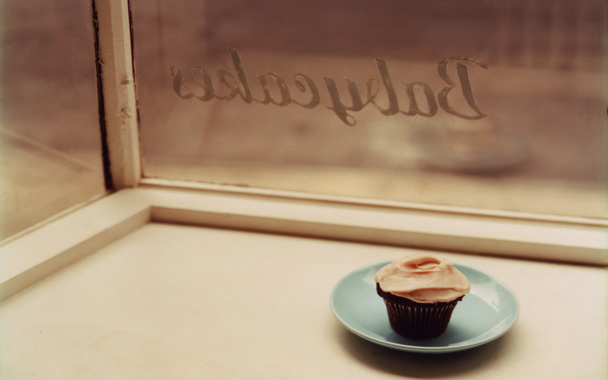Dry, flavorless, hurts after you eat it,” says Amanda Felt, reciting the charges most commonly leveled at vegan desserts. As the owner of Portland’s vegan Black Sheep Bakery, she’s heard them all over the course of the nine years she’s been in business. “I think there were a lot of unfortunate potlucks,” she says with a laugh.
It wasn’t so long ago that vegan desserts were viewed at best as an amusing oxymoron and at worst as some sort of gastronomic punishment wrought by vengeful hippies. But sometime in the last few years, that began to change. The reasons include everything from a growing awareness of organic, healthy eating to the rising number of people diagnosed with food allergies every year (the Food Allergy and Anaphylaxis Network estimates some 12 million Americans have food allergies) to advances in vegan baking techniques and aesthetics. Lately, even dyed-in-the-wool, traditional French pastry chefs have been getting in on the act: François Payard, at the behest of his health-conscious, vegetarian business partner, recently added a vegan chocolate pudding to the menu of his eponymous pâtisserie.
Erin McKenna was driven to experiment out of necessity. While she’s not a vegan, she was diagnosed several years ago with allergies to wheat and dairy. Her diagnosis, combined with a cupcake craving and the desire to create something “that would be fun and cool-looking and didn’t make people feel even more alienated by their food sensitivities or choices,” led to the birth of BabyCakes, a button-cute bakery specializing in vegan, wheat- and gluten-free breakfast pastries and desserts. Since opening on New York’s Lower East Side in late 2005, it has enjoyed great success among vegans and non-vegans alike. BabyCakes reportedly grossed $1.2 million in sales last year, and, thanks to a significant number of customers whom McKenna describes as “celebrities who aren’t even vegan but [are] health conscious,” will open a second Los Angeles location in the spring, right around the time the BabyCakes cookbook is scheduled to hit shelves (this April).
Like McKenna, Michelle Garcia isn’t a vegan. Unlike McKenna, Garcia is a classically trained French pastry chef who bemoaned the “granola-y,” lackluster offerings at the strict vegan bakeries where she used to work. When she opened her all-organic Bleeding Heart Bakery in Chicago in 2004, she created the vegan portion of her menu by translating conventional, non-vegan recipes and eschewed popular dairy-free substitutes like Egg Replacer and carob in favor of ingredients like bananas and sweet potatoes (both of which replicate the thick moisture of eggs) and dark chocolate.
The substitutions are so persuasive, says Garcia, that “a lot of people order birthday cakes from here not knowing they’re vegan.” Right now, she’s experimenting with flax, which can foam like egg whites when aerated, and dreaming of a line of vegan French-style mousse cakes. “That’s what I love to make the most,” she says wistfully.
“If it hasn’t been done, it hasn’t been done yet,” says the Black Sheep’s Amanda Felt, summing up the guiding principle that gives today’s vegan bakers more common ground with molecular gastronomists than Moosewood Cookbook enthusiasts. Like Heston Blumenthal, Grant Achatz, and other contemporary kitchen scientists, many vegan bakers have traditional culinary backgrounds and an understanding of food chemistry. “Learning the basics about food science can rock your dessert world,” says Doron Greenblatt Petersan, whose Sticky Fingers Bakery has won over Washington, D.C with its signature sticky buns. “If eggs are used only for moisture, then replacing them with applesauce might work. But if it’s the leavening, binding, and emulsifying you need, it gets tricky.”
“Tricky” is an apt description of the historically ill-fated craft of vegan ice cream making. While health food stores have long offered a variety of dairy-free frozen desserts, their chalky, sickly sweet taste and texture could make just about anyone long for lactose. When Steve Hirschhorn, a vegan and former restaurant and nightclub owner, approached ice cream consultant (yes, I said ice cream consultant) Malcolm Stogo about developing a line of soy-based ice cream, Stogo was more than a bit skeptical. “He didn’t even know what soy-based ice cream was,” recalls Hirschhorn. But this winter, after more than a year of experimenting, Hirschhorn opened his store, Stogo, in New York’s East Village. The ice cream, which is sweetened with agave and brown rice syrup and uses only natural, organic flavors like pomegranate and pistachio, has won a fast following among everyone from vegans to parents of lactose-intolerant children. Business has been so good that Hirschhorn is already talking about opening new stores in New York and Los Angeles. “We want to be a sort of vegan Ben & Jerry’s,” he says.
In a weird way, vegan desserts are like the pastry world’s version of breast implants: The best ones are indistinguishable from their conventional counterparts. For plenty of vegan bakers, the ultimate compliment is a look of shock. “A lot of people come in and want a brownie with walnuts,” says the Bleeding Heart’s Garcia. “Our only brownie with walnuts is vegan. People will eat it and I’ll tell them it’s vegan and they’re like, ‘What? I would never eat anything vegan.’ And I’ll say, you just did. And you liked it.”



 Pinterest
Pinterest


